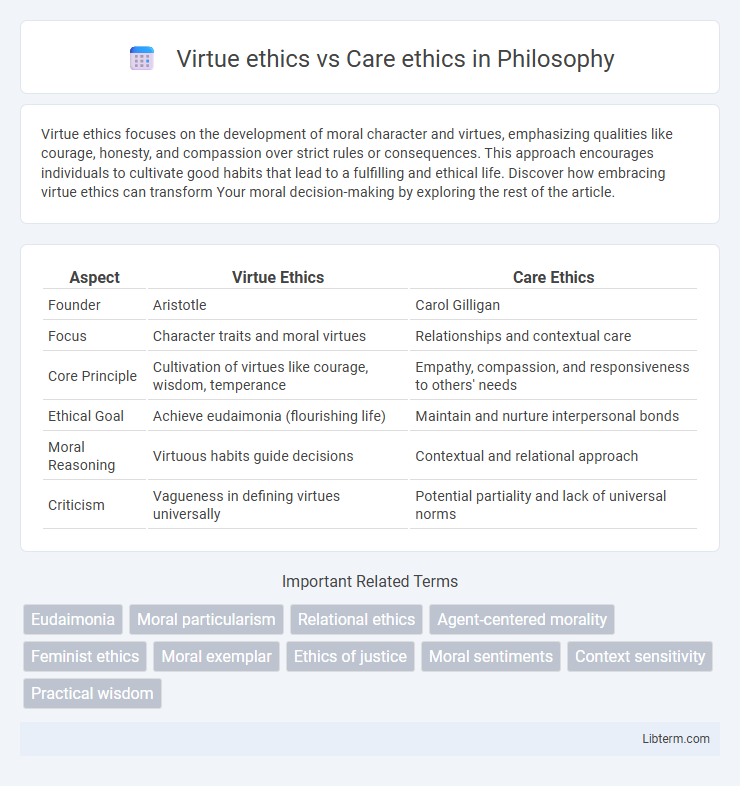Virtue ethics focuses on the development of moral character and virtues, emphasizing qualities like courage, honesty, and compassion over strict rules or consequences. This approach encourages individuals to cultivate good habits that lead to a fulfilling and ethical life. Discover how embracing virtue ethics can transform Your moral decision-making by exploring the rest of the article.
Table of Comparison
| Aspect | Virtue Ethics | Care Ethics |
|---|---|---|
| Founder | Aristotle | Carol Gilligan |
| Focus | Character traits and moral virtues | Relationships and contextual care |
| Core Principle | Cultivation of virtues like courage, wisdom, temperance | Empathy, compassion, and responsiveness to others' needs |
| Ethical Goal | Achieve eudaimonia (flourishing life) | Maintain and nurture interpersonal bonds |
| Moral Reasoning | Virtuous habits guide decisions | Contextual and relational approach |
| Criticism | Vagueness in defining virtues universally | Potential partiality and lack of universal norms |
Introduction to Virtue Ethics and Care Ethics
Virtue ethics centers on character development and moral virtues such as courage, temperance, and justice, emphasizing the cultivation of good habits to achieve moral excellence. Care ethics prioritizes interpersonal relationships and empathy, stressing the moral significance of care and responsibility in human connections. Both frameworks offer distinct approaches to ethics, with virtue ethics focusing on individual character and care ethics highlighting relational context.
Historical Background of Virtue and Care Ethics
Virtue ethics originated in ancient Greek philosophy, particularly through Aristotle's emphasis on character and moral virtues as essential to human flourishing. Care ethics emerged in the late 20th century, primarily through feminist philosophers like Carol Gilligan, challenging traditional ethical theories by prioritizing relationships and empathy. The historical development of virtue ethics centers on individual moral character, while care ethics focuses on interconnectedness and the moral significance of caregiving.
Key Philosophers in Virtue and Care Ethics
Aristotle is a central figure in virtue ethics, emphasizing character traits like courage and temperance as essential for moral development. In care ethics, Carol Gilligan challenges traditional ethics by highlighting the importance of relational interdependence and empathy, focusing on nurturing and responsiveness in moral decision-making. Nel Noddings is another key philosopher who advances care ethics through the concept of an ethic of care rooted in attentiveness and responsibility toward others.
Core Principles of Virtue Ethics
Virtue ethics centers on the development of moral character and virtues such as courage, honesty, and wisdom, emphasizing the importance of habituation in moral growth. It advocates for individuals to act according to moral virtues that promote human flourishing (eudaimonia) rather than strict rules or consequences. This approach contrasts with care ethics, which prioritizes relational interdependence and empathy, highlighting the moral significance of caring relationships over abstract moral principles.
Fundamental Concepts of Care Ethics
Care ethics centers on relational interdependence, emphasizing empathy, compassion, and responsiveness to others' needs as fundamental moral principles. Unlike virtue ethics, which focuses on individual character traits and moral virtues, care ethics prioritizes contextual and interpersonal connections, highlighting the importance of nurturing and sustaining relationships. Key concepts include attentiveness, responsibility, competence, and responsiveness, which guide ethical decision-making through the lens of care and relational dynamics.
Similarities Between Virtue Ethics and Care Ethics
Virtue ethics and care ethics both emphasize the importance of character and moral development in ethical decision-making. They prioritize relational understanding and the cultivation of virtues such as empathy, compassion, and responsibility. Both frameworks reject rigid rule-based approaches, focusing instead on contextual judgment and the nurturing of moral traits that guide ethical behavior.
Differences in Moral Reasoning Approaches
Virtue ethics emphasizes character development and the cultivation of virtues such as courage and honesty as the foundation for moral behavior. Care ethics prioritizes interpersonal relationships and the responsibility to nurture and care for others, focusing on empathy and context-specific responses. This contrast reveals virtue ethics as agent-centered and care ethics as relationally grounded in moral reasoning.
Applications in Contemporary Ethical Issues
Virtue ethics emphasizes character traits such as honesty, courage, and compassion, guiding individuals to cultivate moral virtues that influence ethical decision-making in areas like professional integrity and environmental stewardship. Care ethics prioritizes relational interdependence, empathy, and responsiveness to vulnerability, shaping approaches in healthcare, social justice, and caregiving policies. Both frameworks offer complementary perspectives by addressing ethical dilemmas through personal character development and attentive, context-sensitive relationships.
Strengths and Limitations of Each Theory
Virtue ethics emphasizes character development and moral virtues such as courage, honesty, and compassion, promoting holistic personal growth and ethical decision-making; however, it lacks clear guidance for resolving specific moral dilemmas and can be culturally subjective. Care ethics prioritizes relational interdependence, empathy, and the moral significance of caring practices, offering a nuanced approach to ethics in personal and social contexts, yet it may undervalue justice and universal principles necessary for broader societal norms. Both theories contribute unique perspectives to moral philosophy but require integration with other ethical frameworks to address complex ethical challenges effectively.
Conclusion: Integrating Virtue and Care Ethics
Integrating virtue ethics and care ethics enriches moral philosophy by combining character development with relational sensitivity, fostering more holistic ethical decision-making. Emphasizing both virtues like courage and empathy alongside care-focused responsiveness addresses complex human experiences more effectively. This unified approach promotes ethical frameworks that support both individual moral growth and interpersonal well-being.
Virtue ethics Infographic

 libterm.com
libterm.com